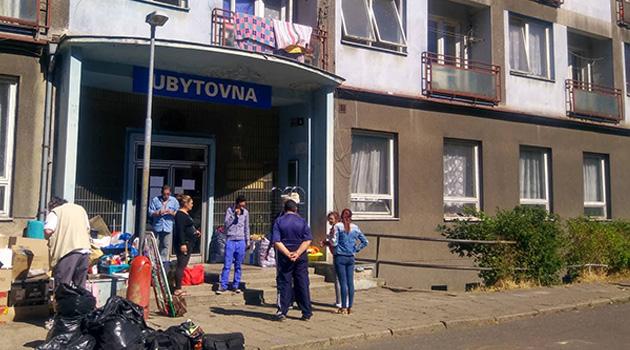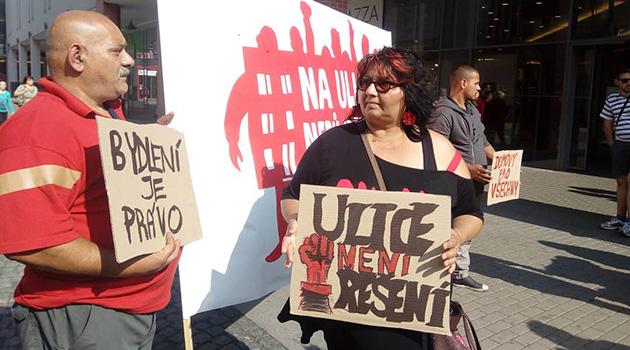Now that evictees are housed, Czech local government attacks NGOs and the poor

The last remaining evictees from two closed residential hotels have finally moved out of the gym at a school in the excluded locality of Předlice and into rental housing. After their previous contracts were not extended, 25 tenants evicted from the Modrá residential hotel in the Střekov quarter of Ústí nad Labem ended up living in the gym temporarily at the beginning of July.
People were also evicted from a residential hotel on Klíšská Street. A total of 230 people had one month to find new homes.
Mayor Věra Nechybová (Ústecké fórum občanů – Ústecké Civic Forum, or UFO) has now issued the following statement about the evictions: “The worst-case scenario that was predicted by different know-it-all advisers of 230 people left to fend for themselves on the street has not come to pass. From the beginning we assured the public nothing of the sort would happen, but despite that we had to face defamatory allegations that the city was doing nothing, and that what was being done was being done badly. Through the joint deployment of social workers from City Hall, the municipal departments, and some nonprofit organizations we have managed to cope with the situation.”
From the beginning, however, the City Hall did not take a very active stance, offering aid just by way of social counseling. The brokering of new housing for the evictees was primarily begun by the Vice-Mayor of the central municipal department where one of the facilities was located, Karel Karika (PRO! ÚSTÍ – FOR ÚSTÍ! party ).
“When I assess this with hindsight, it is necessary to carefully differentiate between the work done by the municipal departments and the work done by City Hall. For example, the Vice-Mayor of the central district, Karel Karika, and his bureaucrats actively found the evictees substitute housing and aided them in other ways, compared to City Hall, which just distributed lists of residential hotels in other towns to the evictees and lists of the streets locally now zoned as locations for which state housing benefits cannot be disbursed,” Miroslav Brož of the Konexe organization told news server Romea.cz.
Karika: None of the evictees whom we aided refused housing
According to the city’s statement, the evictees who ended up living in the gym actually already had new housing arranged for them at that time but waited to move into it for various reasons – for example, because electricity had to be turned on in the units: “Most people from the residential hotels, however, did not demonstrate much activity on their own – these are people who do manage to apply for very complicated welfare benefits, but who apparently do not know how to find a new apartment and deal with all that entails. Many waited for social workers to arrange something for them. Under the influence of so-called human rights activists, some even refused the housing opportunities that were offered to them because they did not meet their needs or because they were in localities that did not seem good to them, and they asserted that the city must award them ‘dignified’ housing because that is their right.”
Karika disagrees with the city’s statement, though. “During the crisis I did not encounter people refusing actual apartments, but I am not counting the offers of unfinished units [Editors: which sometimes lack residential flooring or other fixtures] owned by those who traffic in poverty. From my point of view the most social work was done by social workers of the Město municipal department in collaboration with the Labor Office’s material distress department,” he said, adding that it will now be a problem for some of the evictees to hold onto the housing they are renting.
“If nobody works with these people in the areas of financial literacy, debt forgiveness, keeping track of their utility use, etc., then they may lose their housing over the next few months,” Karika said. He emphasized that the creation of social housing programs would solve the situation.
“If such tenants were in a graduated social housing program they would acquire that experience and then be able to move to the next level of self-sufficiency. Our social benefits system instead creates ‘dependent’ people on welfare, but that’s a discussion for another time,” Karika said.
Brož sees the situation in a similar light. “I would like to primarily thank the residential hotel evictees who found the bravery to stand up for their rights at the beginning of this scandal and who refused to move from the closed residential hotels into other residential hotels in different towns, as City Hall pressured them to do. By their refusing that bad ‘solution’, it became necessary to find a real solution,” he told news server Romea.cz.
Madar: Numbers of “inadaptables” are not declining
Vice-Mayor Jiří Madar (UFO) has not spared nonprofit organizations from criticism, specifically Konexe and People in Need (Člověk v tísni). “From the Konexe association we are accustomed to these kinds of cries, but this time they were even heard from the People in Need association. That organization receives approximately one million crowns [EUR 40 000] annually from the city for projects connected especially with field social work. It was logical that we would turn to them. We anticipated more from them than just empty declarations and speculations about how things should be done correctly,” he said.
Madar also said he views the entire case as a big lesson that should lead to the city reflecting on how to further direct municipal support for nonprofit organizations. “Outcomes are what should be decisive. For the time being it is the case that even after years of nonprofits drawing on municipal subsidies, the numbers of inadaptable inhabitants and welfare recipients are not declining. Information is lacking about how many people the nonprofits have aided with finding official employment or changing their lifestyles. Accommodation in a residential hotel, for many of these people, despite the supervision of nonprofits, has stopped being a temporary solution and has become the norm, and the problems are just growing. When assessing such subsidies and deciding about where to award them next it will be necessary to focus on this issue,” he said.
According to Jan Černý of People in Need, the statement published on the City Hall website means the organization is being challenged to keep improving its informational activities, both about the services it provides to local residents and the problems it faces. “During the next few days we will be inviting the Vice-Mayor to visit us and we are prepared to familiarize him in detail with our insight into the situation,” he told news server Romea.cz.
“It is obvious that the needs of the families we are chaperoning are sometimes at odds both with the law on social services and with the interests of local politicians. In this case it was the aim of the politicians to limit the residential hotel business by applying the ‘measures of a general nature’ [Editors: housing benefit ban zones], and those businesses then ceased their activity as a preventive measure. Disputes about how to advance when addressing such a situation are not unusual in a crisis of this kind, the main thing is that now all the families have some sort of housing,” Černý said.
Election campaign?
Brož has also responded to the criticism from City Hall. “During the crisis Vice-Mayor Madar publicized anti-Romani hoaxes about crime rates rising in Ústí (according to police statistics they have been declining for several years in a row), or allegations that of the 93 000 inhabitants of the city half are Romani, etc. The entire scandal very much seemed to me to be an election campaign by the governing pseudo-party, UFO, which wanted to demonstrate to the voters how it will sweep the Romani people out of town, and it was brilliant to be able to contribute to destroying their plans,” he said.
The crisis situation around the residential hotels happened at the end of May when the operator of the facilities, Lea Anderlová, announced that she would close her business operations in them at the end of June. The owner of both buildings, the CPI Byty company, had previously stated that it would not be arranging to run the facilities on its own.
